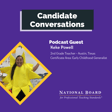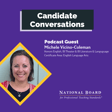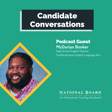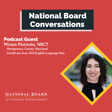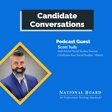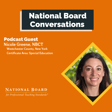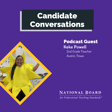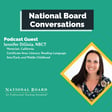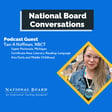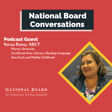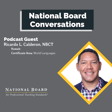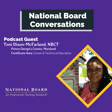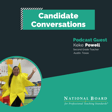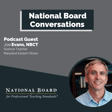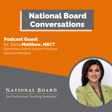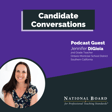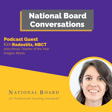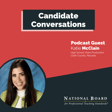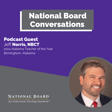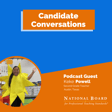Introduction to National Conversations and Tom Courtney
00:00:00
Speaker
Welcome back to National Conversations. I'm your host, Eddie Santiago. And today, Tom Courtney joins us. Tom is a veteran educator with over two decades of experience and is a National Board Certified Teacher.
00:00:11
Speaker
He's taught across the globe from South Korea to Tanzania and has unique perspective on education, leadership, and advocacy.
Tom's Role in Education and Advocacy
00:00:18
Speaker
Tom's passion for education is evident in his work empowering students and teachers.
00:00:22
Speaker
He's deeply involved in shaping education practices, advising his school board on restorative justice, and mentoring other teachers in their pursuit of national board certification. We're excited to explore Tom's insights on creating impactful learning environments, the power of self-driven professional development, and his journey to becoming a national board certified teacher.
00:00:40
Speaker
I won't hold you much longer. Here's my conversation with Tom Courtney.
Tom's Teaching Background and Personal Interests
00:00:48
Speaker
Tom Courtney, thank you for joining on the podcast. are you doing today? I'm doing great. Thanks for having me. All right. right. So we're going to get right into it. Can you give us a brief entry yourself? What's your current role and then where you at?
00:01:00
Speaker
Yeah, sure. I'm a sixth grade teacher. I teach English language arts mostly and English language development. I'm here at Millennial Tech Middle School ah in Southeast San Diego, a Title I public school.
00:01:13
Speaker
Okay. Now three questions to get you a little bit more personally. about like what you about. So what are your three favorite foods? Oh, so whenever I get asked that one, it's always tacos first. And I could probably do like, you know, three favorite foods would be the three type of tacos. Like, you know, you in San Diego, man, you got some good. i you like oh listen, we got carne asada. We got adobata. We got fish tacos. We all kinds of stuff. But, ah but I also got to give it up for Kimpap.
00:01:41
Speaker
any Anybody out there who loves Korean food, you know exactly what I'm talking about. um And I would probably say my third is probably Beef Burgundy because I can't pronounce Beef Burgundy very well, but it's something i always try to make.
Influence of Personal History on Teaching Style
00:01:56
Speaker
Okay, okay. So what are three songs that you keep in rotation? ah I got a 14-year-old, and she's been getting me into David Bowie lately. And I don't know why, but we just put on Starman, and we're, like, in the truck, and ah we just start singing Starman.
00:02:12
Speaker
So that's always on. Okay. And then ah I would probably go – ah This is hard, but second, I'd probably go Beatles yesterday. I mean, it's just always something i listen to.
00:02:24
Speaker
And then third would probably be something like ah maybe Gypsy King's Bombolio. ah just I just, don't know. I just love that beat. Okay. little I like it. I like it. Yeah. All right. So last one, the one sports team that has your heart. And if you're not a sports fan, one movie you can recite long for long.
00:02:42
Speaker
Oh, well, i could recite point break line line for line for sure. But the sports thing has my heart is the Chargers. um But it's not a really healthy relationship. It's kind of like a love-hate thing.
00:02:53
Speaker
So, you know, but we're going to therapy. yeah we We're going to therapy. All So we're going to get into you and about your school a little bit. So what were you like as a student and how does that influence your teaching style?
00:03:07
Speaker
Yeah, ah you know, that's an interesting question because i i do not consider myself a really great student. And so for any teachers out there that um that might have had me, i I'm sorry now.
00:03:21
Speaker
um I just needed a lot of attention. I had a few things going on at home. And I think the number one thing that I needed was an outlet. um a way to show who
Journey to a Teaching Career and Memoir Writing
00:03:32
Speaker
I was. And so my fourth grade year, Miss Simmons in fourth grade put me on the stage.
00:03:37
Speaker
And ah i I was the king in the king's cream puffs. And I got to eat a real cream puff, by the way, up on stage. It was pretty cool. And that changed everything for me. And then from then, I became a straight A student and always have been.
00:03:52
Speaker
So one thing I learned about you was that you love surfing, right? And I plan to join you someday. um Yeah, let's go. yeah Has your passion for surfing influenced your teaching or your connection with students in any way?
00:04:07
Speaker
Yeah, you know, it's interesting because I mean, teachers are always looking for metaphors anyway, and surfing such a perfect one because nobody paddles out to the lineup. I don't care how good you are unless you pay your dues. That's what we call it.
00:04:19
Speaker
You're paying your dues in that whitewater. You're trying to get out there. Some days you can't make it out no matter what you do, um but it always pays off. you know So sometimes you get these small moments, and it feels like you're working so hard, but it's um it's something that just fires me up every single time. and then um But I see the kids, they give a lot of that stuff too, whether it be soccer or other things. So I just try to let them know that to me it's surfing, but to them it's probably something that matters to them. So as long as we have that connection, we usually we usually understand one another.
00:04:53
Speaker
That's really awesome. So let's go back to the beginning of your career. You had a super diverse journey teaching in South Korea right out of college. Yeah. What sparked your initial, what sparked that initial adventure? And did you have any idea would lead to such a fulfilling career as an educator?
00:05:08
Speaker
Yeah, that was crazy because ah what happened, I graduated with economics and I was like working for a lawyer um and, you know, nothing against lawyers or whatever, but um I just, I just, it wasn't my thing.
00:05:21
Speaker
And I was kind of lost and I was surfing and just needed a change. And I i literally went in and and saw a job that said teach English in South Korea. It was that type of moment for me. And um within three weeks, I would say within about three weeks of being in Pohong, South Korea, watching all my little students come in and my my older students and my parents and all these different people come in for English, I just knew that's...
00:05:46
Speaker
teaching was for me. it It was like an immediate thing. And I remember writing everybody and saying, I'm coming back, I'm getting my credential. um This is what I'm supposed to do. So it was like a call-in almost, right?
00:05:59
Speaker
Yeah, I guess you could call it that for sure. I mean, ah but for me, and it has never changed, you know, in all the all the years, I still feel that way. I get psyched for August and September.
00:06:11
Speaker
So in the conversation we had previously, you mentioned that you wrote a book about your experiences there in South Carolina or South Korea. Sorry about that. Yeah. How did that experience shape your perspective on teaching and the impact you have on students?
00:06:27
Speaker
um ah First of all, you know, it was memoir. And so when you write memoir, it's kind of it's kind of like a journey for you to take to actually went back last year. I hadn't been back to South Korea in like 25 years and I went looking for people and I wasn't able to find the people that I was hoping to find. And so for me, it was actually kind of a I guess a spiritual journey, if you will, but I realized something. And I kind of talked about it in the and the epilogue of the book. And that was that, um you know, if if you're if you're someplace special, if you're with special people, um it's only for that moment. You know, i went back thinking, oh, these people are going to remember me and I'm going to be walking around. They'd like, hey, there's Tom. And, you know, there's there's the way Gook Sodom and all that stuff. And
00:07:16
Speaker
And that didn't happen. And so when I came back, the number one takeaway for me was that wherever you are in the moment, especially as a teacher in a classroom, you care about everybody. You do everything you can. You try to make all those connections, inspire as many people as you can, because that's the moment you get.
Pursuit and Impact of National Board Certification
00:07:35
Speaker
So let's dive into National Board Certification. ah What motivated you to pursue?
00:07:42
Speaker
You know, I'm a yes person. So ah but ah my journey as a teacher began in 1999 here in the United States. And I would say for the first 10 to 15 or so years, I was a yes person in terms of, yes, I will teach this curriculum. Yes, I will teach that. Yes, I will that.
00:08:03
Speaker
teach this. But I don't think I was a reflective teacher. I don't think I was asking the tough questions that I know now is just part of my everyday practice, as part of my practice when I work with student teachers, induction candidates.
00:08:17
Speaker
And so around COVID for me, I began to ask what I feel now are some powerful questions. You know, how is my relationship with my students? How do I present for myself with my students?
00:08:29
Speaker
How can I be better at ah where are my students coming from? um That kind of stuff. And I began to do some reading and those types of things. And why when I began to realize that what I was doing was powerful, but yet I had a lot to learn.
00:08:45
Speaker
That's when I be kind of became what on on what I call my self professional development journey. Instead of doing what other people were telling me I should do to better myself as as a teacher, I began to realize that I could find those avenues and, and show that and I knew that national board certification was going to be one of those because I had heard from friends that it was challenging, but it was motivating and empowering. And that's, that's what I'm all about. So that that's how when I first realized I was going to ah seek national boards.
00:09:18
Speaker
So As you know, the certification process involves several components. Which component did you find most challenging? Which did you find much most rewarding? And what did you learn about your own teaching through the process?
00:09:30
Speaker
Yeah, that' that's a great question. I mean, I'll answer the um well, first of all all, all of them were very rewarding. um Even the test, the component, the first component for me was was quite uplifting because I did much better than I thought I would.
00:09:45
Speaker
And that to me was really important because it told me, hey, you've learned a few things and, you know, all these years you've been teaching. um And because when when I just looked at the test at first, it was really, really difficult.
00:09:57
Speaker
But then when I really sat down and really started to think about it, I really did know quite a bit about my teaching. So all of them have been pretty pretty rewarding. The one that was the most challenging for me definitely was component four.
00:10:09
Speaker
Component four involved with assessment and then also in terms of taking that assessment and doing something with it. For me, that had always been kind of like an isolated product process. Like here I am, I got all my data, I'm looking at it, ah you know, I'm i'm um reflecting on it and whatnot, but i don't I'm not seeking out partners and other people to do that.
00:10:30
Speaker
i I did some of that work with when I worked with a student teacher. But component four of, don't want to say it forced me to, but it challenged me for sure. It challenged me to go out and really kind of create a collaboration, professional learning community at site. And that was the first time I had done that at my site. I had done that outside of my site.
00:10:52
Speaker
um But then I realized that I could i could kind of go about that. And so it was challenging at first, and then it became very rewarding um ah knowing that I can go and um and create a PLC kind of whenever I need.
00:11:07
Speaker
That's pretty awesome. So you're currently a mentoring a cohort of teachers going through the certification process. Yeah. What common challenges do you see them face and what strategies do you share to help them succeed?
00:11:21
Speaker
Yeah, that's a really good question, too, because it's interesting. um Almost all of them have expressed um the same thing that I think I expressed, maybe not exactly the same words, but I kind of if I had put it in a quote, I would say ah it comes out at first like this. It says, yes, but what does that look like?
00:11:41
Speaker
Yes, but what does that look like? So I need to show that I'm accomplished in this or that. Yes, but what does that look like? And I think um when I first began, ah was constantly seeking success.
00:11:55
Speaker
The example. What is the example here? What is the example here? And I realize now that, you know, when I did my credential program, there were examples for everything. When I when I did my um ah masters, there were examples for everything.
00:12:08
Speaker
But in national boards, the reason I think it's the reason i love it, one of the major reasons is because um there's you don't see an example. It says, hey, you're an accomplished teacher. Show us what you have.
00:12:20
Speaker
Remember the the standards. Remember all of the things that an accomplished teacher does. And now show us how you went about doing it. And so it forces you to kind of come back in your classroom, stare at your four walls and go, what am I really about?
00:12:34
Speaker
what What is this thing that I call you know this this great unit that I've planned? What does that actually look like? And so for them, I think that they've seen the same thing. and it's been really neat to watch um how they go about the process. They first start off, i'm I'm just trying to box in and understand you know what I need to do ah in terms of national boards. And then they go, wait a second.
00:12:57
Speaker
I'm already doing this. And if I include this or this or this, I will kick it up to 10 different levels. And wouldn't that be awesome for my teaching anyway? And now I can go off and tell somebody what I did and that kind of stuff. So, um so yeah.
00:13:12
Speaker
It's always nice to hear that moment when teachers realize that it's already stuff they're doing in the classroom. They're kind of, ands they can, it's a chance for them to take it to the next level.
Advice for Certification Candidates
00:13:24
Speaker
So for teachers who are considering national board certification, what's your top piece of advice and what should they know going in? Yeah, that's a really good question. um the The first thing i would recommend ah to teachers going in is the first thing you're going want to do is compartmentalize everything that you're asked to do.
00:13:41
Speaker
Because right now, um if you haven't done National Board Certification before, it might look like this big, you know scary monster in the closet. you know You open up the door and you're like, oh it's just going to attack me. But really, National Board Certification is a series of components, and each of those have very well written and explained tasks for you to do.
00:14:03
Speaker
So once you understand um that there's a a process and a compartmentalization that you do, that for me was key. I took took um all of the different things that that was gifted ah given to me after printing everything out. I'm a print guy, so I printed everything out off of National Board's website.
00:14:24
Speaker
I just kind of went through it and said, okay, so for you know component one, this is what I need to do. Component two, this is what I need to do. and And underneath there, I need to do this and then this and then this and then this.
00:14:35
Speaker
um And i'm very I'm very tangible in that sense. So i actually wanted to see the forms. What form do I turn in and this kind of thing. Once I had all that in folders, I was like, let's go get the work done.
00:14:46
Speaker
So now let's let's get in the class and show that and and kick this up and that kind of stuff. So that would be my first thing to understand what the process entails. um because you're not going to be overwhelmed by it. You're actually going to realize that you can do component one.
00:15:02
Speaker
You can do component two. You can do component three. Then you make your timeline. Then you make your schedule. All right. Do I want to try this in one year? Do I want to give myself two years? Do i have a little baby at home?
00:15:14
Speaker
I have a one of my induction candidates right now. I don't even like to call her an induction candidate. She's such an amazing teacher. Kelly Gonzalez, if you're listening, and she's doing national boards.
00:15:25
Speaker
And so, you know, that's but she has a lot going on. She's ah she does ah Boy Scouts and all these other different things, just an amazing person or community. And so she's decided to kind of compartmentalize and work at her schedule. And I think that's key.
00:15:40
Speaker
All right, let's move to some leadership. You're involved in some really interesting leadership roles, like advising the school board on restorative justice practices. In what ways do you think national board certification process prepared you for the enhanced, ted prepared you for these leadership roles?
Leadership in Restorative Justice and Advocacy
00:15:57
Speaker
Yeah, um that's a really good question too. so So the thing about national boards that feels different and is different from a lot of other ah what I would call professional development type ah things, including even my masters, I would say, is that ah you're doing things that are asked of you.
00:16:20
Speaker
They say, do this, you do that. They say, do this, you do that. But in national boards, what you are doing is actually showing, you're you're creating showcases. Each of those components is a, it's like the proof.
00:16:32
Speaker
it's like the proof It's like the proof of what you are already doing well. And once you realize that those meet ah of criteria and you see those fireworks, you kind of realize that, hey, I'm doing some amazing things.
00:16:46
Speaker
it It uplifts you, it empowers you. And then what does one want to do after that? One wants to go and say, hey, listen, I've just been this guy in this classroom, um you know, doing my thing. I'm not really sure and this kind of stuff. But now I realize that what I'm doing ah has is really moving kids and is is and i've got I've got the proof that to prove that.
00:17:09
Speaker
And so now I need to go tell other people. And that's exactly where a lot of my, what I would call my advocacy comes in, not just restorative justice practices, but when I write articles or do other things, all of those things are a way for me to show, hey, something's working in my classroom and I'm an expert on something in this classroom.
00:17:29
Speaker
I spent a lot of years early on as a teacher not feeling like I was an expert ah in the classroom, maybe justifiably so. But nowadays, I know certain times of the day i'm I'm an expert on certain things, and now it's time to share that.
00:17:45
Speaker
So national boards kind of gave me that sort of let's take a look at what we got, let's know what we got, and now let's go share what we got. And that's kind of embedded in all the components, component two, three, and four anyway.
00:17:58
Speaker
So what are some key things you've implemented and what impact has it had on your students and school community? ah In terms of just RJ? or yeah Yeah. um Well, actually, it's it's it's neat because i I'm the secretary ah secretary of a of a council. we're called the We call ourselves the Exemplary Teacher Advisory Council.
00:18:21
Speaker
And we are composed of district and county teachers of the year here in San Diego. So there's just some really amazing people I get to learn alongside of. um And I've actually learned quite a bit about restorative justice practices through many of the leaders there, Renee Thomas and Leah Samick and some of the other extraordinary leaders there. And so um I've actually I've actually learned.
00:18:45
Speaker
ah kind of been an example of of when I don't understand something and how to come back and bring that in my classroom. So one of the things I didn't understand, I was very confused about what RJ was. I wasn't sure, is this anti-racist teaching?
00:18:59
Speaker
um You know, what is this? And so through our research, one of the cool things we've come up with and discovered is that the administration of RJ was not Something that was that was a perfect pattern.
00:19:12
Speaker
In fact, we found that even in San Diego Unified, ah nearly all the teachers weren't trained in RJ. And yet in middle school, only a few, and then high school, even fewer. So imagine being in a district K through 12, where some people know what RJ is and other people don't.
00:19:28
Speaker
um And so that kind of is where we found the the key component. And that's exactly like national boards. That's exactly like national You find what you need, and then you go do it, and then you show what you got, and then and then you change things.
00:19:42
Speaker
A lot of interweaving of national board and a lot of these things.
Transition from Elementary to Middle School Teaching
00:19:45
Speaker
Yeah. So you've moved from elementary to middle school in recent years. What prompted that change and what are some of the biggest differences you've experienced?
00:19:54
Speaker
Okay, now don't laugh, but no, because this is true and you know you're going to think I'm a little crazy, but I was hiking a volcano In Guatemala. it's spring great And I was like by this tree, i was all winded. and I was like, you know, and something needs to change around here.
00:20:11
Speaker
um And I started I don't know why. And I started thinking about I've been teaching for 25 years. I've been at elementary school. And there was just this whole cycle of things. I'd gotten to a point where i was I was kind of sharing my views with others and those types of things. But the number one thing that happened was I would tell my fifth graders, I'd say, you know, you you all need to be ready because in middle school, you got to do X, Y, and Z. And there was one young person.
00:20:36
Speaker
i don't remember who it was, but he raised his hand and he was like, well, Mr. Courtney, you don't teach middle school. So how do you know? and I was like, Oh, I just know, you know, and then so I was driving home and I was thinking about it. And then maybe I was at that tree up on the volcano and I went, you know, let's go for it.
00:20:55
Speaker
Never look back. I love it here at middle school. It's fantastic. Yeah. So what are some what are some of the big differences you've experienced in the in the move? Oh, listen, any teacher listening to this is going to know right away, straight up, you get preps, you get preps of middle school.
00:21:09
Speaker
My elementary school teacher friends, you've got to get out, you got to take a you got to take a ah ah personal day and come over to middle school. We actually get an hour every day to like send emails and stuff. It's crazy. Nobody told me.
00:21:23
Speaker
nay Yeah, and i don't want to and and I don't want to make it sound like it's much easier. It isn't. Middle school comes with a lot of other challenges too. But ass very I find both of them are extraordinarily rewarding.
00:21:34
Speaker
And what I love most is seeing now I have a lens of elementary school and a lens at middle school. And so you can see things that you didn't see before. don't know what I'm going to do with that yet, but um but it's very fascinating.
Teaching Legacy: Impact on Former Students' Children
00:21:49
Speaker
there's there's some There's some big discovery in there yet. So you've been in your community for a little while now, and you're now you're teaching the children of a some of them your former students. Yeah. What's that experience like, and how does it deepen your connection to the community?
00:22:02
Speaker
Oh, dude, it's straight crazy. I mean, it is crazy. 122 students in my sixth grade class, and six of them are children of former students. So I feel bad for some of them sometimes, because Zaden, no, straight up, Zaden's over here, and he'll say something class, and we tease each other and all that.
00:22:20
Speaker
and And I'll be like, hey, do I have to call your dad, Sammy? you know Because if i call him, he's going to be like, what's up, Mr. Courtney and blah, blah, blah. And it's just I don't know how to describe it. There's nothing like it. And again, anybody who's listening to this, whether you've experienced this or you haven't yet.
00:22:37
Speaker
You can envision that this is what it's all about. There is nothing better that has ever happened to me as a teacher than when I get to see a student who is a former student come full circle.
00:22:49
Speaker
So it really is – almost get emotional about It's a good thing, though, because I can't cry. i had my tear-neutral moved. when I came to middle school, because don't want to cry in front of kids. But if I could cry, might cry over it because it's special. It's special to see the impact that you've had on kids and then when they become adults.
Inspiration for Aspiring Teachers
00:23:10
Speaker
So now I tell people all the time, when I look at the kids in the classroom, they're still children, but now I also see them as future adults. And I see them walking in my classroom. What would they say to me then?
00:23:22
Speaker
Right. And that that has really empowered my teaching and, and probably, I'm sure it changed me as a human for the better. That's pretty awesome. So if you had to sell the teaching profession to someone looking to get into it in one to two minutes, what would you use as an elevator pitch?
00:23:41
Speaker
Yeah, I mean, there's like the elevator pitch in one minute, and then there's like the elevator pitch in like five hours. But the one minute version of that would probably be ah if then statements, right?
00:23:54
Speaker
You know, if you drive by a school and you wonder, you know, like, Could I make an impact on the kids that are that are there? You know what I mean? You know, you might you might want to be a teacher. Right. um um But, you know, if you think back to school and you remember, you know, teachers really changing your life.
00:24:13
Speaker
um then you know you you probably are you've probably got a teacher inside of you. know And you know and if you you know if you long, and I know that's a weird word to use, but I think that's the best word I can think of.
00:24:25
Speaker
If you long to inspire others and make changes, and I'm not talking about within just a kid, I'm talking about community-wide, because that will be the impact you will leave on a community, um ah hopefully for the better as a good teacher, but um but that will be your your your legacy.
Acknowledgments and Closing Remarks
00:24:44
Speaker
And so so if if those things matter to you, then you're you're meant to be a teacher. Just like you know just like if you – I was a volunteer fireman for a while, so if you drive by a burning building and you go man, I'd really like to spray some water on that, you're probably meant to be a firefighter.
00:24:58
Speaker
it's Yeah. Yeah. All right, last question, then we'll let you get out of here. We have a feature on the podcast called The Shoulder Tap. It's when you tap someone on the shoulder and let them know they're actually be ready to become National Board certified. On here, we give them a quick shout out, and we'll encourage them through social media to go through the process.
00:25:17
Speaker
So, Tom, Courtney, who are you shoulder tapping? Oof. Now, see, that's that's a tricky question. So you saved the you save the worst for last um because there's a lot of people. There's a lot of people, especially in the state of California, that I'd love to see. So um can I give like shouts out?
00:25:32
Speaker
Of course. Okay, cool. All right. Well, then California Reading and Literacy Project, let's go. i know i'm in I'm in community with like 40 of you from time to time, and um the stuff that you're doing is already so incredible.
00:25:45
Speaker
um Show that you're an accomplished teacher. Become national board certified. um Teacher for Global Classrooms, my Fulbright Fellows, let's go. we get that National Board Certification.
00:25:55
Speaker
It does open up doors. um All my induction candidates, Kelly, Adriana, Rachel, um go get it. I think kelly's Kelly's already there. So go get And all my colleagues here at MTM, we have ah we have a good cohort there, Mr. Berman and Ms. Hillard and all of you get those components turned in.
00:26:16
Speaker
All right, all right. Tom Courtney, thank you for joining me on the podcast. You know it. Thanks for having me. I hope you found Tom's insights as valuable as I did. His journey from getting to see his passion for teaching in South Korea to empowering students and teachers through restorative justice practices is a powerful reminder of educators' impact.
00:26:36
Speaker
If you're inspired by Tom's dedication and his advocacy of self-driven professional development, please subscribe to National Board Conversations on your favorite podcast platform and leave us a review. We love hearing from Check out our show notes for links to resources on restorative justice, information about national board certification, and maybe even a recipe or two for beef burgundy, one of Tom's favorite dishes.
00:26:56
Speaker
Until next time, keep pursuing educational excellence. And as Tom would remind us, never stop paddling out to catch the next wave of inspiration.

